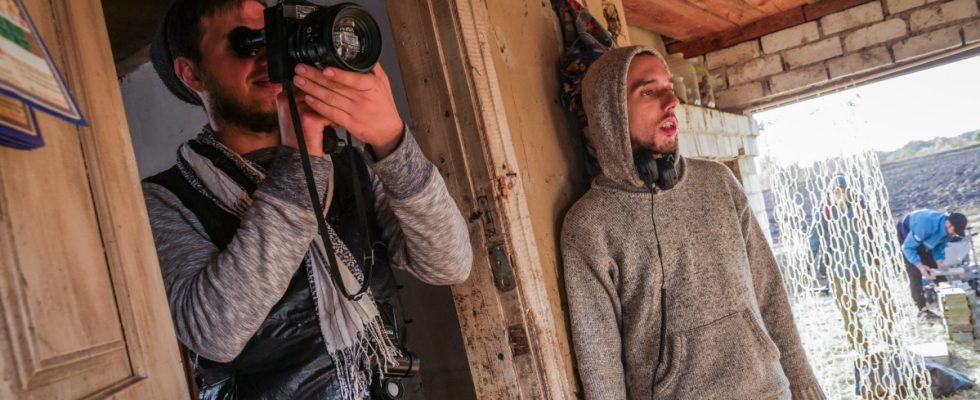There is also a bit of poetry in the terror: when sunflower fields and coal mines turn into the scene of a war crime and butterflies become harbingers of death. On July 17, 2014, passenger plane MH17 crashed over eastern Ukraine. Butterfly-shaped splinters were found in the pilot’s corpse and bullet holes in parts of the wreckage of the plane also show these shapes – unmistakable evidence for those responsible for the tragedy: A rocket had caused the launch, it came from the Buk air defense system of the Russian army.
Roman Liubyi’s artistic documentary “Iron Butterflies”, which can now be seen at the Munich Dok-Fest, provides a complex and poetic examination of the events surrounding the tragic plane crash. Step by step, the Ukrainian filmmaker unmasks the insidious lies and strategies of the Russian propaganda machine in his sensitive and touching collage of archive material, news and social media clips as well as staged passages.
The film seems like a painful clarification of the history of the brutal war of aggression in Ukraine. Liubyi was concerned with bridging the events from 2014 to 2022 and making them accessible to a wider audience: “The war is the logical consequence of this unpunished war crime,” says the Ukrainian, who lives in Kiev, in a Zoom interview.
Just as exciting and complex as “Iron Butterflies” is the story of its origin. The German-Ukrainian co-production might never have existed without the war. Not only does it provide a unique example of how wartime filmmaking works. The project also tells a lot about solidarity and the belief that film can make a difference.
Mila Zhluktenko from Munich, who comes from the Ukraine, plays an important role in this structure. The HFF student, who first worked as a dramaturgical consultant and later as a co-author on “Iron Butterflies”, brought him to the Munich production company Trimafilm and the Ukrainian documentary became a hybrid that a western audience could understand. During a visit to Kiev in 2016, Zhluktenko met cameraman and producer Andrii Kotliar, who in turn introduced her to Liubyi. Both are part of the film collective “Babylon’13: Cinema of Civil Society”, which has set itself the task of first documenting the events on the Maidan and then also war crimes in Ukraine. The idea of the collective was to combine art with activism, says the director. This resulted in many short and long films, all of which are freely accessible online (babylon13.org.ua).
As an artistic documentary, “Iron Butterflies” tells the story of the passenger plane crash in eastern Ukraine.
(Photo: Dok-Fest Munich)
The day after the Russian invasion began, Zhluktenko launched a fundraising campaign to support her friends at Babylon’13 with essential film equipment. Shortly thereafter, the HFF student received support from a number of Munich filmmakers, including Daniel Asadi Faezi and David Armati Lechner from Trimafilm, to drive a first delivery of material with camera equipment to the Polish-Ukrainian border to hand it over to Babylon’13 members .
The outbreak of war not only suddenly changed the lives of Ukrainians, but also shifted their focus to existential problems. Kotliar and Liubyi couldn’t find enough money or resources to finish Iron Butterflies, which was already in the rough cut. Although the broadcaster Arte had promised financial support, a German co-producer was missing to be able to realize the project. In search of “accomplices”, as Zhluktenko calls it, she contacted Trimafilm, who quickly jumped on the project and took over large parts of the post-production.
The most important thing for everyone involved was that the film was the result of a shared responsibility and an artistic interest, emphasizes the HFF student, who also made her own short film “Waking up in Silence” about refugee Ukrainian children in a Schweinfurt barracks at the Dok-Fest shows: “In order to implement such things, you need a kind of irrational will. A sense of community that pulls together for a cause.”
Because of the war, the completion of “Iron Butterflies” was anything but easy: there was no stable electricity, communication was often difficult, and it took a full four weeks for the original film material to land in Munich. “With our expertise, we were able to provide concrete help and not just donate money,” says Armati Lechner. And Trimafilm colleague Isabelle Bertolone adds: “When you zoom in with someone who could be alarmed at any time and you realize that working together gives you strength, then you feel the meaningfulness of the project.” Towards the end of the documentary, images can be seen of people crossing a blown bridge in Irpin in April 2022. The recordings are from Babylon’13, their statement is unmistakable.
“Iron Butterflies”, director: Roman Liubyi, 84 min., original subtitles, on May 9 & 13, (both days Q&A with co-author Mila Zhluktenko), “Waking up in Silence”: director: Daniel Asadi Faezi, Mila Zhluktenko , May 13, New Maxim

